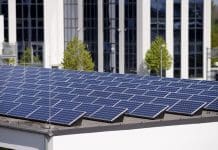LHC Procurement Group (LHC) is seeking contractors to take part in an initiative to improve energy efficiency and reduce carbon emissions in the UK’s public sector buildings and social housing
LHC, which specialises in public sector construction frameworks, is inviting contractors and consultants to engage in discussions and provide input on proposals for their upcoming Decarbonisation and Retrofit framework, known as N9.
LHC is hosting a pre-tender engagement (PTE) webinar on September 20, where interested parties can participate in shaping this new framework.
LHC will listen to stakeholder feedback
During the PTE process, LHC will focus on areas such as meeting the PAS (Publicly Available Specification) requirements, exploring new technologies, and ensuring the inclusion of small and medium-sized enterprises (SMEs) to create a better framework.
N9 will serve as a successor to LHC’s Energy Efficiency Measures and Associated Works (N8) framework. It builds upon LHC’s 30-year history of delivering solutions for energy efficiency procurement.
N9 will provide public sector clients with better access to suppliers offering a wider array of technologies and services that target Energy Performance Certificate (EPC) ratings for social housing.
The public sector is facing serious challenges over retrofitting housing and to improve energy efficiency. The social housing sector alone comprises 4.4m properties in the UK, and there are a further 1.9m non-domestic public buildings.
“It’s clear our selection criteria must align with relevant standards to ensure N9 is robust, meets the expectations of all stakeholders and supports LHC’s drive to becoming a Gold Standard framework provider,” said Dean Fazackerley, LHC’s head of technical procurement.
“We’d encourage would-be suppliers for our N9 framework to attend the webinar, as it presents a unique opportunity to work in collaboration with our dedicated technical team to shape the framework in its early stages.”
What areas will the N9 framework cover?
N9 is divided into seven workstreams. These are Building Insulation and Performance, Heating Systems, Control and Management Systems, Electrical Servicing and Maintenance of Renewable Systems, Multi-Disciplinary Works, and Consultancy.
“In the coming months, we will be working with suppliers and clients to set out individual requirements for each lot, as different standards will be necessary depending on the nature of the work,” added Fazackerley.
“N9 will be operating within a highly competitive market, with the potential for changes in government policy and the rapid evolution of the energy sector during its four-year term. That’s why pre-tender engagement is so important for us in helping to identify opportunities to futureproof the framework as much as possible for the years to come,” he concluded.
You can find out more information on the N9 framework and sign up for the webinar here.














